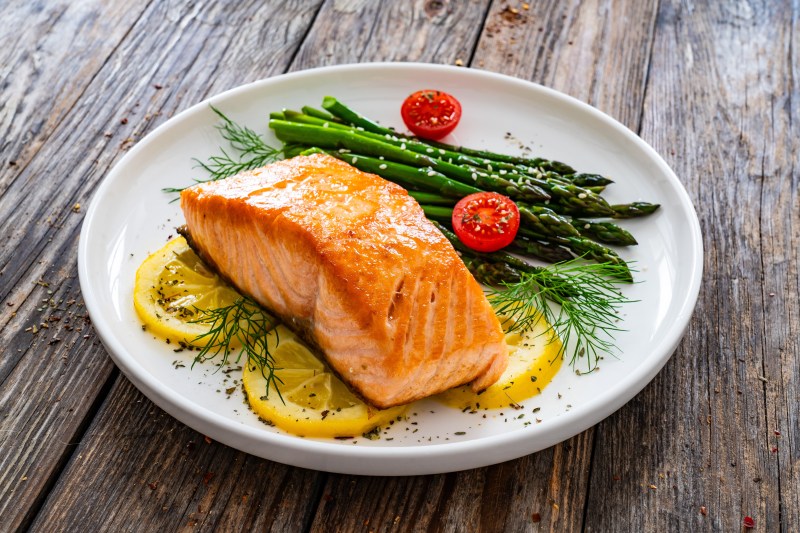We all want to live healthier lives. Sometimes, it feels like there’s so much conflicting information out there. But one thing that most experts agree on?
Eating the healthiest foods is a crucial component of good health, no matter your eating style. I’ve helped tens of thousands of patients achieve great results with simple adjustments to the foods they consume.
I’m going to simplify things and show you seven of the healthiest foods to eat that should be staples in any healthy diet.
Seven of the Healthiest Foods to Eat
1. Sauerkraut
Sauerkraut, made from fermented cabbage, isn’t just delicious; it’s incredibly good for you. Sauerkraut is very low in carbs and packed with vitamins, minerals, and antioxidants.
With only 1.9 net carbs per cup, it fits perfectly into a low-carb lifestyle and provides a wide range of nutrients.
Here’s why I recommend adding sauerkraut to your diet:
- Vitamin C Powerhouse – One cup has a whopping 700 milligrams of vitamin C, more than most fruits and vegetables, making it a good source of nutrients for immunity. Vitamin C is vital for collagen, bones, and protecting your heart.
- Prebiotics and Probiotics – It’s naturally fermented, offering prebiotic fiber to nourish your gut bacteria and probiotic benefits vital for a healthy gut, unlike yogurt, where those good bacteria often get destroyed in the stomach.
- Cruciferous Benefits – Cabbage is a cruciferous vegetable, meaning it contains special compounds linked to powerful anticancer effects. It offers many phytonutrients for added health benefits beyond basic vitamins and minerals.
- Digestive Support: It helps with regularity thanks to its acetylcholine content, stimulating digestion and aiding nutrient absorption.
2. Arugula
Forget spinach. When it comes to leafy greens, arugula should be your go-to salad base.
While spinach is packed with oxalates, which can bind to calcium and lead to kidney stones, arugula is very low in oxalates. Arugula is an excellent source of vitamins and minerals.
Here’s why it’s a winner in my book:
- Anti-inflammatory Superstar – Its unique compounds effectively combat inflammation throughout the body.
- Rich in Antioxidants: Like other cruciferous vegetables, arugula helps your body fight damaging free radicals that contribute to aging and chronic disease.
- Liver Health Booster: Arugula naturally detoxifies your liver, keeping it functioning at its best.
- More Than Just Greens: It’s a great source of calcium, potassium, folate, magnesium, vitamin C, and vitamin K1 for added nutritional value. Plus, arugula is loaded with nitrates, which turn into nitric oxide in the body; nitric oxide helps improve circulation and lower blood pressure.

3. Salmon
Salmon is a nutritional powerhouse and a tasty grain. Always opt for wild-caught salmon, as it tends to have a better nutrient profile than its farm-raised counterpart.
It’s highly nutritious due to its high omega-3 fatty acid content, making it one of the healthiest foods to eat.
- Omega-3 Powerhouse – Most people consume far too many omega-6 fatty acids (found in processed foods and vegetable oils) and not enough omega-3s. This imbalance throws your body into an inflammatory state, but salmon is full of anti-inflammatory omega-3 fatty acids. Oily fish can help reduce the risk of many diseases.
- Heart and Brain Health: Omega-3s are not only anti-inflammatory but are well-known to support cardiovascular and cognitive function, and salmon delivers them in abundance.
- Selenium Benefits: Salmon provides selenium which supports your metabolism, immune system, and thyroid function.
- Don’t Forget the Skin. – It contains concentrated heart-healthy fats, so eat it.
4. Cod Liver
Organ meats are making a comeback as people discover just how nutrient-dense they are. But I understand, organ meats aren’t the most popular.
However, saturated fats, which cod liver is loaded with, provide lots of benefits and shouldn’t be feared in a balanced diet.
I make cod liver a staple in my diet; it has an almost pudding-like texture, is packed with vital nutrients, and provides one of the best sources of Vitamin D.
Here are some of the amazing benefits of cod liver:
- Omega-3 Power Up – Even Better than Fish Oil – Cod liver (and cod liver oil) boasts an impressive amount of EPA and DHA, omega-3s your body needs, along with vitamins A and D not usually found in regular fish oil supplements.
- Liver Powerhouse – Just like sauerkraut helps with digestion, cod liver is incredibly good for the liver. Vitamin A in cod liver helps to decrease fat deposits and prevent liver injury, leading to overall improved liver health.
- High Fat-to-Protein Ratio: Cod liver has a 5:1 fat-to-protein ratio, meaning it won’t spike your blood sugar. Foods lower on the insulin index, such as this, help your body burn fat for fuel.
- Eye and Immune System Support: The active form of vitamin A, known as retinol, plays a vital role in supporting vision and a robust immune system.
5. Grass-Fed Beef
Grass-fed beef, especially hamburgers, is one of the healthiest foods to eat, offering a significant source of high-quality protein and important nutrients.
Grass-fed beef has higher levels of omega 3 fatty acids called alpha-linolenic acid (ALA).
Here are some of the benefits of choosing grass-fed beef:
- High in Bioavailable Iron: If you struggle with iron deficiency or anemia, grass-fed beef offers iron in an easily absorbed form.
- Loaded with Vitamins and Minerals: It provides significant B vitamins (especially B12), zinc, phosphorus, selenium, and creatine for muscle health.
- Gut-Friendly: When cooked right, the higher fat content in a hamburger can make it easier to digest than steak.
6. Pecans
Nuts can be tricky on a low-carb diet, with some containing more carbs than others. But pecans are unique because of their incredibly low net carb count.
Pecans are also full of fiber. Not only are they lower in net carbs, but they also boast other great health advantages.
Here’s why you should add more pecans to your diet:
- Lowest Net Carb Nut – They contain about 4g net carbs per cup, making them a guilt-free keto-friendly snack choice that offers plenty of healthy polyunsaturated fatty acids, which, among other things, help build and maintain your cell membranes.
- Heart Healthy – Pecans contain monounsaturated fats, such as oleic acid, which may positively affect your cholesterol levels and reduce heart disease risk.
- High in Antioxidants: Pecans offer more antioxidants than other popular nuts. They can help your body combat damage from free radicals, offering protection against chronic diseases like diabetes and heart conditions.

7. Extra Virgin Olive Oil
Not all cooking fats are created equal. Extra-virgin olive oil is in a league of its own regarding health and longevity.
The polyphenols, antioxidants found abundantly in extra-virgin olive oil, offer remarkable health benefits beyond what you’ll find in refined olive oils.
You can include small amounts of olive oil in your diet. Drizzle it on your salads, use it to saute your favorite vegetables, but choose extra-virgin unsaturated fats whenever you can.
Here are the powerful benefits of incorporating olive oil into your diet:
- Loaded with Antioxidants – It has a rich profile of antioxidants. Some even rival green tea in their ability to protect cells from free radical damage.
- Brain Health – Studies show compounds in extra-virgin olive oil may protect your brain. They’ve been linked to a reduced risk of cognitive decline, especially those associated with conditions like Alzheimer’s.
- Powerful Anti-inflammatory Effects: Olive oil’s anti-inflammatory properties have been shown to be comparable to some pain relievers.
Elevating Your Diet with Nutrient-Rich Vegetables
Incorporating oven roasted vegetables into your diet is one of the simplest and most effective ways to enhance your overall wellness.
Vegetables like broccoli, cauliflower, carrots, and Brussels sprouts, when roasted, retain their nutrients while adding a delicious, caramelized flavor.
These nutrient-dense vegetables are packed with vitamins, minerals, and antioxidants that support immune health, digestion, and energy levels.
By roasting vegetables, you can create versatile, easy-to-prepare meals that contribute to a balanced and nutritious diet.
Including a variety of colorful vegetables in your daily routine is a great way to ensure you’re consuming a wide range of essential nutrients for optimal wellness.
Conclusion
Building a plate based on real, whole foods is one of the best ways to care for your health. Choosing to focus on nutrient-dense, delicious foods like these is always a win for your well-being.
Start by incorporating these healthiest foods to eat into your meals and experience the difference they can make.
By making simple switches and including more of these powerhouses, you’ll be on your way to optimizing your health. Remember, consistency is key.








